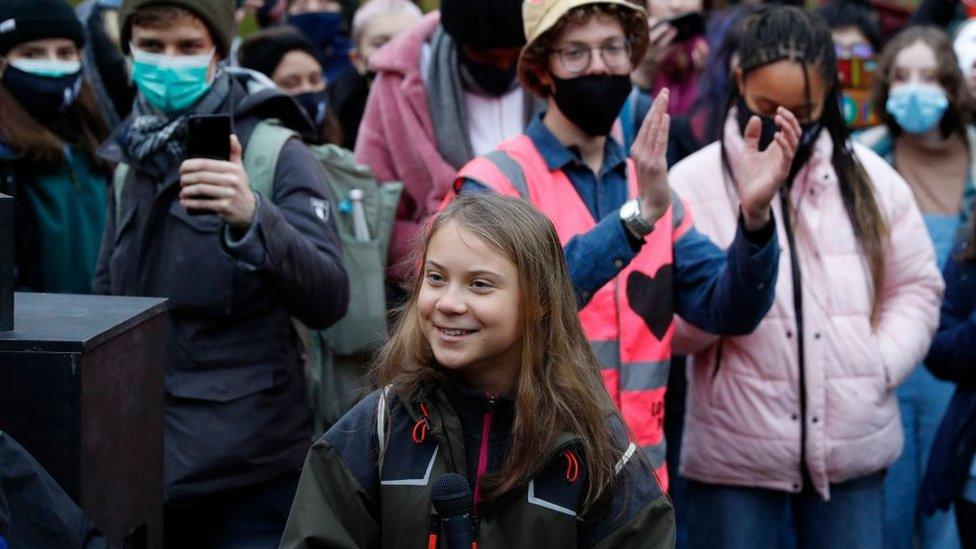Climate education: New climate change plans for schools as young people prepare to protest in Glasgow
- Published
- comments

Greta joined a protest in a park in Glasgow when she arrived
As Greta Thunberg gets ready to join young people in climate marches in Glasgow, new plans are being announced to boost climate education in schools and to help young people be more eco-friendly.
Schools in England will be encouraged to be more environmentally conscious and pupils will be recognised for their efforts to protect the planet in a new Duke of Edinburgh-style award.
It's one of a series of measures aimed at putting climate change at the heart of education.
Let us know in our vote if you feel teachers and pupils need to focus more on climate change in lessons and as part of school life. And you can have your say - and tell us what you do already - in the comments below.
Greta expected to join protests
Climate strikes like this are expected outside the COP26 conference
Young people will march in Glasgow today in a call for leaders to take what activists call "meaningful international action" on climate change.
In a post on social media, Greta Thunberg said: "On Friday 5 Nov I'll join the climate strike in Glasgow, during COP26.
"Climate justice also means social justice and that we leave no one behind. So we invite everyone, especially the workers striking in Glasgow, to join us. See you there!" she added.
Despite not being officially invited to the summit, Ms Thunberg arrived at the conference by train along with 150 youth activists earlier this week.
If you can't see this vote, click here.
Greta was met by crowds of young people when she arrived in Glasgow by train
Greta has been critical of the discussions at COP26 calling them "blah, blah, blah".
But she also said it was "possible in theory" to reach an agreement in Glasgow.
"We know that change is possible, because we can look back in history and see that there have been massive changes in society," she said.
"If we felt like there wasn't any hope, we wouldn't be activists."
What is the new kids climate change award?
Could solar panels on school roofs be the way forward?
The Climate Leaders Award announced by the UK government aims to help children develop their skills and knowledge in biodiversity and sustainability, with their work recognised at an annual national awards ceremony.
It's one of a series of measures aimed at putting climate change at the heart of education which will be set out by Education Secretary Nadhim Zahawi at the COP26 climate summit in Glasgow.
Pupils will be able to progress through different levels of the award - bronze, silver and gold - in a similar way to the Duke of Edinburgh's Award, which includes volunteering and extracurricular activities.
His suggestions also include wanting children and young people to increase the biodiversity of their nursery, school or college by taking small steps like installing bird feeders.
Mr Zahawi - who's in charge of education in England - says his range of ideas aim to teach children the importance of conserving and protecting our planet.
He is also making other announcements about boosting climate education in schools, including plans to try out "energy pods" that can replace gas and coal boilers and supply a school's heating and hot water without carbon emissions.
Biodiversity is a measure of how many different species live in an ecosystem. Human activities like changing land use, deforestation and peat bog destruction reduce this.
Areas like tropical rainforests have millions of different species and are very biodiverse. Other areas like the polar regions have far fewer species and are less biodiverse.
Nadhim Zahawi, the Education secretary, is announcing some climate education proposals at COP26
"Empowering teachers in every school to deliver world-leading climate change education will not only raise awareness and understanding of the problem, but also equips young people with the skills and knowledge to build a sustainable future," he said.
Geoff Barton, general secretary of the Association of School and College Leaders, said schools were already working "very hard on tackling climate change" but "children and young people rightly want to see far more concerted action."
Climate change lessons around the UK
Climate change is already taught in science and geography lessons in England as part of the curriculum, but according to the new annoucnements, children will also learn more about nature and their impact on the world.
In schools in Scotland, climate change is addressed across the curriculum, not in specific lessons, with pupils expected to get a "whole school approach" to learning about sustainability from ages three to 15,
The government gives examples of schools installing solar panels in schools and learning about renewable energy in science classes.
In Wales a new curriculum is coming from 2022 which will also include addressing the challenges of climate change across a range of subjects. Schools will be expected to design their own lessons for this around guidelines.
A Welsh Government spokesperson said: "The new curriculum will ensure major issues such as climate change are taught across many areas of learning and experience, rather than in a single narrow subject area only."
In Northern Ireland, the issues raised by climate change are mandatory in the science and geography curriculum and are compulsory through to Year 9.
